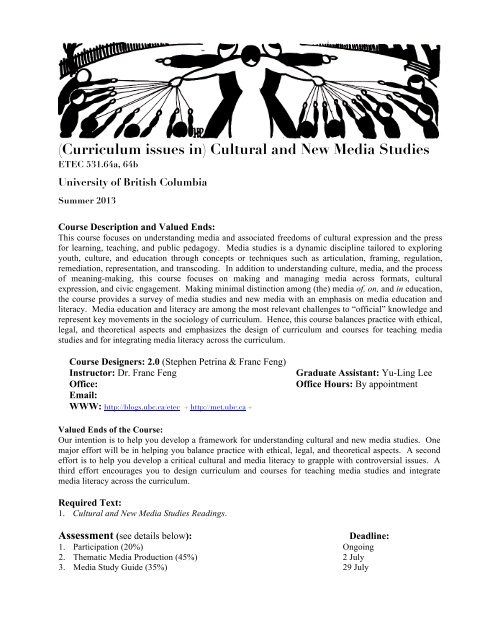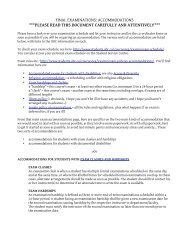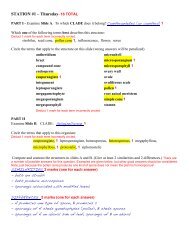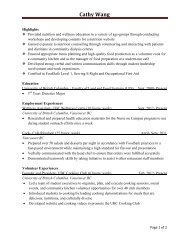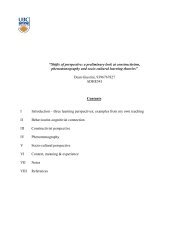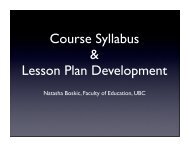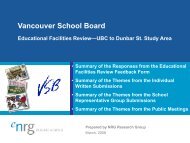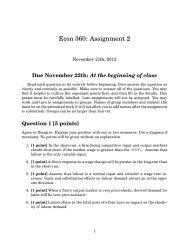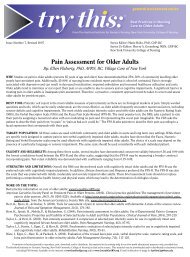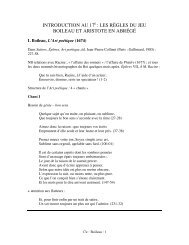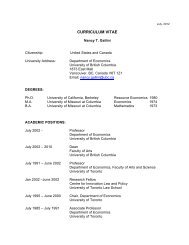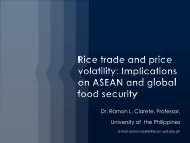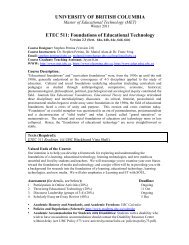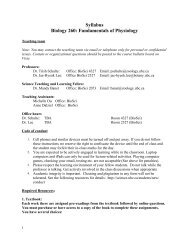online ETEC 531 (2013) - UBC Blogs - University of British Columbia
online ETEC 531 (2013) - UBC Blogs - University of British Columbia
online ETEC 531 (2013) - UBC Blogs - University of British Columbia
You also want an ePaper? Increase the reach of your titles
YUMPU automatically turns print PDFs into web optimized ePapers that Google loves.
(Curriculum issues in) Cultural and New Media Studies<br />
<strong>ETEC</strong> <strong>531</strong>.64a, 64b<br />
<strong>University</strong> <strong>of</strong> <strong>British</strong> <strong>Columbia</strong><br />
Summer <strong>2013</strong><br />
Course Description and Valued Ends:<br />
This course focuses on understanding media and associated freedoms <strong>of</strong> cultural expression and the press<br />
for learning, teaching, and public pedagogy. Media studies is a dynamic discipline tailored to exploring<br />
youth, culture, and education through concepts or techniques such as articulation, framing, regulation,<br />
remediation, representation, and transcoding. In addition to understanding culture, media, and the process<br />
<strong>of</strong> meaning-making, this course focuses on making and managing media across formats, cultural<br />
expression, and civic engagement. Making minimal distinction among (the) media <strong>of</strong>, on, and in education,<br />
the course provides a survey <strong>of</strong> media studies and new media with an emphasis on media education and<br />
literacy. Media education and literacy are among the most relevant challenges to “<strong>of</strong>ficial” knowledge and<br />
represent key movements in the sociology <strong>of</strong> curriculum. Hence, this course balances practice with ethical,<br />
legal, and theoretical aspects and emphasizes the design <strong>of</strong> curriculum and courses for teaching media<br />
studies and for integrating media literacy across the curriculum.<br />
Course Designers: 2.0 (Stephen Petrina & Franc Feng)<br />
Instructor: Dr. Franc Feng<br />
Office:<br />
Email:<br />
WWW: http://blogs.ubc.ca/etec + http://met.ubc.ca +<br />
Graduate Assistant: Yu-Ling Lee<br />
Office Hours: By appointment<br />
Valued Ends <strong>of</strong> the Course:<br />
Our intention is to help you develop a framework for understanding cultural and new media studies. One<br />
major effort will be in helping you balance practice with ethical, legal, and theoretical aspects. A second<br />
effort is to help you develop a critical cultural and media literacy to grapple with controversial issues. A<br />
third effort encourages you to design curriculum and courses for teaching media studies and integrate<br />
media literacy across the curriculum.<br />
Required Text:<br />
1. Cultural and New Media Studies Readings.<br />
Assessment (see details below):<br />
Deadline:<br />
1. Participation (20%) Ongoing<br />
2. Thematic Media Production (45%) 2 July<br />
3. Media Study Guide (35%) 29 July
Operational Definition <strong>of</strong> Letter Grade Categories<br />
(EDCP, Revised, 2008)<br />
A level - Good to Excellent Work<br />
A+ (90-100%) A very high level <strong>of</strong> quality throughout every aspect <strong>of</strong> the work. It shows the individual (or<br />
group) has gone well beyond what has been provided and has extended the usual ways <strong>of</strong> thinking and/or<br />
performing. Outstanding comprehension <strong>of</strong> subject matter and use <strong>of</strong> existing literature and research. Consistently<br />
integrates critical and creative perspectives in relation to the subject material. The work shows a very high degree<br />
<strong>of</strong> engagement with the topic.<br />
A (85-89%) Generally a high quality throughout the work. No problems <strong>of</strong> any significance, and evidence <strong>of</strong><br />
attention given to each and every detail. Very good comprehension <strong>of</strong> subject and use <strong>of</strong> existing literature and<br />
research. For the most part, integrates critical and creative perspectives in relation to the subject material. Shows a<br />
high degree <strong>of</strong> engagement with the topic.<br />
A- (80-84%) Generally a good quality throughout the work. A few problems <strong>of</strong> minor significance. Good<br />
comprehension <strong>of</strong> subject matter and use <strong>of</strong> existing literature and research. Work demonstrates an ability to<br />
integrate critical and creative perspectives on most occasions. The work demonstrates a reasonable degree <strong>of</strong><br />
engagement with the topic.<br />
B level - Adequate Work<br />
B+ (76-79%) Some aspects <strong>of</strong> good quality to the work. Some problems <strong>of</strong> minor significance. There are<br />
examples <strong>of</strong> integrating critical and creative perspectives in relation to the subject material. A degree <strong>of</strong><br />
engagement with the topic.<br />
B (72-75%) Adequate quality. A number <strong>of</strong> problems <strong>of</strong> some significance. Difficulty evident in the<br />
comprehension <strong>of</strong> the subject material and use <strong>of</strong> existing literature and research. Only a few examples <strong>of</strong><br />
integrating critical and creative perspectives in relation to the subject material. Some engagement with the topic.<br />
B- (68-71%) Barely adequate work at the graduate level.<br />
NOTE: For <strong>UBC</strong>’s Faculty <strong>of</strong> Graduate Studies (FOGS), a final mark below 68% for Doctoral students and<br />
below 60% for Masters students is the equivalent <strong>of</strong> a Failing mark.<br />
C & D level - Seriously Flawed Work<br />
C (55-67%) Serious flaws in understanding <strong>of</strong> the subject material. Minimal integration <strong>of</strong> critical and creative<br />
perspectives in relation to the subject material. Inadequate engagement with the topic. Inadequate work at the<br />
graduate level.<br />
D level<br />
D (50-54%)<br />
F level - Failing Work<br />
F (0-49%)<br />
q Academic Honesty and Standards, and Academic Freedom: <strong>UBC</strong> Calendar 2012/13<br />
q Policies and Regulations (Selected): http://www.students.ubc.ca/calendar<br />
q Academic Accommodation for Students with Disabilities: Students with a disability who wish to<br />
have an academic accommodation should contact the Disability Resource Centre without delay (see<br />
<strong>UBC</strong> Policy #73 www.universitycounsel.ubc.ca/ policies/policy73.pdf).<br />
Text and Readings<br />
The required texts for the course frame the weekly modules. As a graduate student, you are expected to<br />
complete all <strong>of</strong> the readings and modules for the week. Although I do not expect you to read the entire<br />
contents <strong>of</strong> websites to which you are directed within the modules, I do expect you to browse the sites and<br />
familiarize yourself with the content. The bi-weekly live forums and discussion threads are two effective<br />
media for you to communicate your responses, understandings, feelings, and questions <strong>of</strong> the readings.<br />
Please take advantage <strong>of</strong> these media, which in turn can be cut and pasted into your e-Portfolio.<br />
2
The course proceeds in a more or less linear, case-based approach from week 1 to week 11 with <strong>online</strong><br />
synchronous forums scheduled bi-weekly (once every two weeks) to correspond with modules and<br />
readings. However, the entire course, including all modules, is accessible.<br />
Course Schedule<br />
Date<br />
Week 1<br />
13-19 May<br />
Live<br />
Forum<br />
Module Assignment Readings & Topics<br />
- Course Intro Course introduction, Media Studies, Mapping &<br />
Definitions<br />
Week 2<br />
20-26 May<br />
#1 - #2 Readings &<br />
Assignments<br />
Media Semantics, Rhetoric and Epistemology<br />
What is or Who are (the) Media<br />
Week 3<br />
27 May-2<br />
June<br />
Wed<br />
6:00-<br />
7:00<br />
#2<br />
Readings &<br />
Assignments<br />
Media & Technology Education / Media &<br />
Technological Literacy or Literacies<br />
Week 4<br />
3 -9 June #3<br />
Readings &<br />
Assignments<br />
Techniques & Theory in Media Studies<br />
Media Production<br />
Week 5<br />
10-16 June<br />
Wed<br />
6:00-<br />
7:00<br />
#4 Readings &<br />
Assignments<br />
Regulation <strong>of</strong> the Citizen and Media<br />
Free Speech and Freedom <strong>of</strong> the Press<br />
Free Inquiry / Freedom <strong>of</strong> Thought<br />
Regulatory Codes / Codes <strong>of</strong> Ethics<br />
e-Portfolios Initiated<br />
Week 6<br />
17-23 June<br />
#5 Readings &<br />
Assignments<br />
Academic Freedom / Teaching Controversial Subjects<br />
/ Course and Resource Approval<br />
Week 7<br />
24-30 June<br />
Wed<br />
6:00-<br />
7:00<br />
#6<br />
Week 9<br />
8-14 July #7<br />
Media<br />
Production<br />
Copyright & Intellectual Property Rights<br />
Due: 2 July<br />
Week 8: Study Break 1-7 July<br />
Readings &<br />
Assignments<br />
Media Methods<br />
Week 10<br />
15-21 July<br />
Wed<br />
6:00-<br />
7:00<br />
#8<br />
Readings &<br />
Assignments<br />
Media & Technology Theory<br />
Week 11<br />
22-28 July<br />
#9 Readings &<br />
Assignments<br />
History <strong>of</strong> Media & Technology<br />
Week 12<br />
29 July-2<br />
August<br />
Wed<br />
6:00-<br />
7:00<br />
-<br />
Media Study<br />
Guide Due: 29<br />
July<br />
3
Module 1<br />
Media Semantics, Rhetoric and Epistemology<br />
What is or Who are the Media<br />
Readings / Media<br />
1. Petrina, S. (2010). On (the) media. Unpublished manuscript. Author / Course Portal Access.<br />
2. Guillory, J. (2010). Genesis <strong>of</strong> the media concept. Critical Inquiry, 36, 321-362. Library Portal<br />
Access.<br />
Module 2<br />
Media & Technology Education / Media & Technological Literacy or Literacies<br />
Readings / Media<br />
3. Hobbs, R. (2010, November). Digital and media literacy: A plan <strong>of</strong> action. Washington, DC: Aspen<br />
Institute. Downloaded from http://www.knightcomm.org/digital-and-media-literacy-a-plan-<strong>of</strong>-action/<br />
Open Access.<br />
4. Hobbs, R. & Jensen, A. (2009). The past, present, and future <strong>of</strong> media literacy education. Journal <strong>of</strong><br />
Media Literacy Education, 1, 1-11. http://jmle.org/index.php/JMLE/issue/view/1 Open Access.<br />
5. Bazalgette, C. (1992). Key aspects <strong>of</strong> media education. In M. Alvarado & O. Boyd-Barrett (Eds.),<br />
Media Education: An introduction (pp. 199-219). London: Open <strong>University</strong> Press. Course Portal<br />
Access.<br />
6. Merrin, W. (2009). Media studies 2.0: Upgrading and open-sourcing the discipline. Interactions, 1(1),<br />
17-34 Library Portal Access.<br />
7. Saltau, M. (2007). Not just another teen movie: Juno. Screen Education, 51, 110-115. Library Portal<br />
Access.<br />
Module 3<br />
Media & Technology Production<br />
Readings / Media<br />
8. Musburger, R. B. & Kindem, G. (2009). Introduction to media production: The path to digital media<br />
production (Chapter 2). Boston: Elsevier. Course Portal Access.<br />
4
9. Academy <strong>of</strong> Motion Picture Arts and Sciences. (2008). Teachers guide series.<br />
http://www.oscars.org/education-outreach/teachersguide/index.html Open Access.<br />
Module 4<br />
Regulation <strong>of</strong> the Citizen and Media<br />
Free Speech and Freedom <strong>of</strong> the Press<br />
Free Inquiry and Freedom <strong>of</strong> Thought<br />
Regulatory Codes / Codes <strong>of</strong> Ethics<br />
Readings / Media<br />
10. Watkinson, A. M. (1999). Freedom <strong>of</strong> expression and assembly. In Education, student rights, and the<br />
Charter (pp. 74-91). Saskatoon, SK: Purich Publishing. Course Portal Access.<br />
11. Cooper, M. A. (2008). Bong hits 4 Jesus… in Canada Educational Law Journal, 18(1), 57-77. Library<br />
Portal Access.<br />
12. Hoover, B. J. (2009). The First Amendment implications <strong>of</strong> Facebook, Myspace, and other <strong>online</strong><br />
activity <strong>of</strong> students in public high schools. Southern California Interdisciplinary Law Journal, 18, 309-<br />
328. Library Portal Access.<br />
13. Society <strong>of</strong> Pr<strong>of</strong>essional Journalists. (1996). Code <strong>of</strong> ethics. Download from<br />
http://www.spj.org/pdf/ethicscode.pdf Open Access.<br />
14. Radio-Television News Directors Association. (2007). Code <strong>of</strong> ethics.<br />
http://www.rtndacanada.com/ABOUT/PDF/RTNDAwelcomebooklet.pdf Open Access.<br />
15. National Scholastic Press Association. (2009). Model code <strong>of</strong> ethics.<br />
http://studentpress.org/nspa/pdf/wheel_modelcode<strong>of</strong>ethics.pdf Open Access.<br />
16. Entertainment S<strong>of</strong>tware Rating Board. (2009). A parent’s guide to video games, parental controls, and<br />
<strong>online</strong> safety. http://www.esrb.org Open Access.<br />
Module 5<br />
Academic Freedom / Teaching Controversial Subjects / Course and Resource Approval<br />
Readings / Media<br />
17. Salas, K. D. (2004). How to teach controversial content and not get fired. In The new teacher book.<br />
Milwaukee, WI: Rethinking Schools.<br />
http://www.rethinkingschools.org/publication/newteacher/NTFired.shtml Open Access.<br />
18. Clarke, P. (1993). Teaching controversial issues. Green Teacher, 31, 9-12. Course Portal Access.<br />
19. Petrina, S. (2008). Academic freedom for K-12 teachers. In S. Mathison & W. Ross (Eds.),<br />
Battleground: Schools: An encyclopedia <strong>of</strong> conflict and controversy, Volume 1 (pp. 1-11). New York:<br />
Greenwood. Author / Course Portal Access.<br />
20. Fountain, R. (1998). Sociologics: An analytic tool for examining socioscientific discourse. Research in<br />
Science Education, 28(1), 119-132. Library Portal Access.<br />
Module 6<br />
Copyright & Intellectual Property Rights<br />
Readings / Media<br />
21. Philip, K. (2005). What is a technological author The pirate function and intellectual property.<br />
Postcolonial Studies, 8(2), 199-218. Library Portal Access.<br />
22. Potter, A. (2003). Is copyright unconstitutional THIS Magazine, 37(2), 22-25. Course Portal Access.<br />
23. Liang, L., Mazmdar, A. & Suresh, M. (2004). Copyright/copyleft: Myths about copyright.<br />
CounterCurrents.org. http://www.countercurrents.org/hr-suresh010205.htm Open Access.<br />
5
Module 7<br />
Media & Technology Methods<br />
Readings / Media<br />
24. Becker, A. D. (1977). Alternate methods for media research. AV Communication Review, 25(2), 81-94.<br />
Library Portal Access.<br />
25. Burgess, J. & Harrison, C. M. (1993). The circulation <strong>of</strong> claims in the cultural politics <strong>of</strong> environmental<br />
change. In H. Anders (Ed.), The mass media and environmental issues (pp. 198-221). New York:<br />
Leicester <strong>University</strong> Press. Library Portal Access.<br />
26. Voith<strong>of</strong>er, R. (2005). Designing new media education research. Educational Researcher, 34(9), 3-14.<br />
Library Portal Access.<br />
27. Wilson, B. A. (1980). Interpretation: The one and the many. Queen’s Quarterly 87(1), 16-30. Course<br />
Portal Access.<br />
Module 8<br />
Media & Technology Theory<br />
Readings / Media<br />
28. Murphie, A. and Potts, J. (2003). Culture and technology (Chapter 1). New York: Palgrave Macmillan.<br />
Course Portal Access.<br />
29. Volcic, V. (2001). A critical historical overview <strong>of</strong> media approaches. Medij, 7(1-2), 45-67. Open<br />
Access.<br />
30. Feng, F. (2003). The circuit <strong>of</strong> nature. In Between immediacy and reification: Quotidian pedagogy, and<br />
the recovery <strong>of</strong> language and meaning in nature. (Unpublished Ph.D. diss., <strong>University</strong> <strong>of</strong> <strong>British</strong><br />
<strong>Columbia</strong>) (excerpt, pp. 35-42). Author / Course Portal Access.<br />
31. Feng, F. (2008) Re-thinking the world: Revisiting being, knowing and doing as pedagogical response<br />
to global challenges. Paper for Sociology <strong>of</strong> Education Network (SOCIENET). Congress 2008- CSSE-<br />
Educational Perspectives- Thinking Beyond Borders / Global Ideas: Global Values. Vancouver. BC.<br />
Author / Course Portal Access.<br />
Module 9<br />
History <strong>of</strong> Media & Technology<br />
Readings / Media<br />
32. Kittler, F. & Ogger, S. (2001). Computer graphics: A semi-technical introduction. Grey Room, 2, 30-45.<br />
Library Portal Access.<br />
33. Agar, J. (2005). Medium meets message: Can media history and history <strong>of</strong> technology communicate.<br />
Journal <strong>of</strong> Contemporary History, 40(4), 793-803. Library Portal Access.<br />
Assignments<br />
Please remember that in an <strong>online</strong> graduate course, you have a responsibility to do the readings,<br />
complete the modules, and participate in <strong>online</strong> discussions, both synchronous and asynchronous.<br />
Many activities and assignments, other than the readings, will deal with non-print media. The<br />
module and thematic analysis assignments are intended to help you to develop skills and knowledge<br />
in the design and production <strong>of</strong> new media. These assignments ought to be progressively<br />
sophisticated in audio and video media.<br />
Assignment submissions: Please submit all assignments via the Assignments tool and link to your<br />
e-Portfolio (e.g., link to MP on YouTube).<br />
6
1. Thematic Media Production<br />
Media productions are the hallmark <strong>of</strong> cyberspace— Communication and participation are blends or<br />
convergences <strong>of</strong> image, text and sound. Certainly, students <strong>of</strong> new media technologies ought to be<br />
conversant in all <strong>of</strong> these modalities. This assignment challenges you to creatively express yourself as well<br />
as apply your technical skills. Produce one media production that thematically responds to one or more<br />
questions from any modules (out <strong>of</strong> nine) <strong>of</strong> your choice. Another option is to generate a new question for<br />
one <strong>of</strong> the modules. Prepare mediated responses that indicate your thoughtful engagement with the<br />
content. The media should be thorough and designed to inspire dialogue in the LMS forums.<br />
A number <strong>of</strong> options are available for producing your thematic media productions. You could produce a<br />
media production with power point, Java slide show (export ppt file as html), animation (use formats such<br />
as .avi, .gif or .swf), or a video camera. The media production can be in compressed formats such as .avi,<br />
.mov, .mpg, .qt, .rm, flv, etc. and should be about 5 minutes in length (Examples are provided). An<br />
approach might be to script an interview <strong>of</strong> yourself in front <strong>of</strong> a video camera. When submitting, please<br />
include your name in your file and indicate versions. For universality <strong>of</strong> access and ease <strong>of</strong> marking,<br />
include an iPod-compatible file (e.g., (H-264, mpeg4), in addition to your source file format. Please see<br />
me, if you are interesting in interviewing a peer or participant (<strong>UBC</strong> Research Ethics Board implications).<br />
Thematic Media Submissions:<br />
When ready, simply submit your media production via the Assignments tool and link to your e-<br />
Portfolio (e.g., link to your MP on YouTube).<br />
Total: xx / 45<br />
Media Production<br />
Low------------Avg------------High<br />
Thoroughly addresses key concept(s) in modules<br />
1---------------5.5----------------10<br />
Synthesizes with theory (and theorists)<br />
1---------------5.5----------------10<br />
Sufficient examples are provided<br />
1---------------5.5----------------10<br />
Communication and media are pr<strong>of</strong>essional in format—<br />
Style is clean and coherent<br />
1---------------5.5----------------10<br />
Media take advantage <strong>of</strong> a range <strong>of</strong> technologies<br />
1---------------3----------------5<br />
7
2. Media Study Guide (Film / Theatre / TV Series / Game Study Guide)<br />
Contribute a section to a book created by <strong>ETEC</strong> <strong>531</strong> peers. Choose a film / theatre show, TV series, or<br />
video game that a) is coordinated with your peers; b) is appropriate, appealing, and relevant to students at<br />
either the grades 8-10 or 11-12 levels (if there are students wishing to design for the elementary level,<br />
please contact the Instructor); c) addresses key concepts in media education. The study guide should be<br />
written for 8-10 or 11-12 students and include the following elements: (Groups <strong>of</strong> 2)<br />
a. Introduction: Introduce your topic and its learning outcomes.<br />
b. Key Concept/s: What key concepts does this emphasize and reinforce<br />
c. Content @ Image, Sound & Text: Write effective text and insert appropriate images or<br />
reference sound files to give meaning to the topic.<br />
d. Focus Questions: State questions that are both direct and open-ended to draw students into<br />
the content and lead them toward inquiry and thought.<br />
e. Activities: Provide 1-2 activities that actively involve the students and provide an<br />
experiential and media production dimension.<br />
f. Sources for Further Study: Include sources that provide students with a means <strong>of</strong><br />
following up on the topic.<br />
g. Study Guide Format: Use graphic design and desktop publishing principles and s<strong>of</strong>tware<br />
for laying out the final draft (5-6 colour pages).<br />
Media Study Guide<br />
Low------------Avg------------High<br />
Clarity <strong>of</strong> communication / writing<br />
1---------------5.5--------------10<br />
Development <strong>of</strong> Content and Activities<br />
1---------------5.5--------------10<br />
Key Concepts and Focus Questions<br />
1---------------3--------------5<br />
Provision <strong>of</strong> effective and sufficient examples<br />
1----------------3---------------5<br />
Total: xx / 35<br />
Grammar & Format<br />
1----------------3---------------5<br />
8


